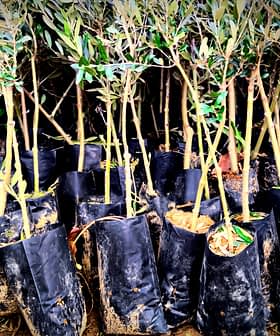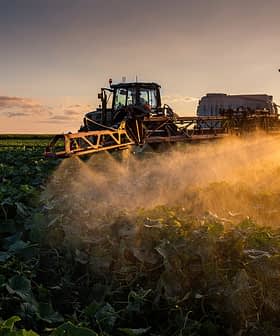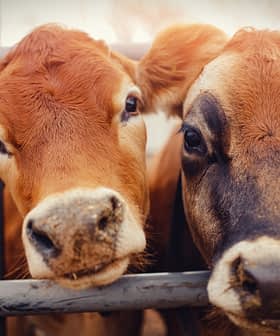E.U. Moves to Block Deforestation-Derived Imports, Including Some Palm Oil
A new European Commission proposal aims to significantly slash imports of commodities associated with deforestation, especially in Brazil, Indonesia and Malaysia.
 Palm plantation in Aceh Indonesia
Palm plantation in Aceh Indonesia The European Union is proposing to halt imports of goods linked to deforestation, including soy, beef, palm oil, cocoa, coffee, leather, and furniture, in an effort to address the alarming loss of global forests. The new regulation would require trade operators and producers to provide information on the origin of products, with the goal of reducing carbon emissions related to E.U. consumption by almost 32 million metric tons.
The European Union may soon halt the imports of goods linked to deforestation.
A new European Commission proposal targets products that have contributed to the alarming phenomenon of global forest loss, including soy, beef, palm oil, cocoa, coffee, leather and furniture.
According to the Food and Agriculture Organization of the United Nations (FAO), 420 million hectares of forest globally were lost to deforestation between 1990 and 2020, an area approximately the size of the European Union.
See Also:Climate CoverageThe FAO added that in that same period, the difference between the area of forest cleared and newly planted or regenerated is about 178 million hectares, an area about three times larger than France.
According to the Intergovernmental Panel on Climate Change (IPCC), almost 11 percent of all greenhouse gas emissions are linked to deforestation.
The commission said the proposal builds on the previous E.U. initiatives aimed at forest protection and the E.U.-wide consultation of European citizens, who largely approve of measures to curtail forest degradation.
Additionally, the European Commission is confident that the new rules will set an example for the world to follow.
“Indeed, with the proposal for this regulation, the E.U. is assuming responsibility for the alarming loss of forests worldwide and leading the way in addressing the problem,” sources from the European Commission’s environment, maritime affairs and fisheries department told Olive Oil Times.
“The initiative is groundbreaking, showing that the E.U. wants to lead by example,” the commission said. “It takes a decisive step forward by moving beyond illegal deforestation to address any deforestation driven by agricultural expansion to produce commodities.”
“We also want to inspire others to act,” the sources added. “We would like to see commitments from major markets, like the United States and China, to clean up their supply chains, and we’re willing to support producing countries in their transition to sustainability.”
The list of the commodities regulated by the new proposal will be under constant review from the commission. To continue exporting their products to the E.U., trade operators and producers will have to execute due diligence to offer certainties about the origin of the products.
With the new rules, companies will have to voluntarily certify and offer complete access to information such as the type of commodity, the production volumes, the involved suppliers and the country of production.
Exporters will have to specify the exact geographic coordinates of the production and certify that their product chain abides with local laws.
“As deforestation is linked to land-use change, monitoring deforestation requires a precise link between the commodity or product placed on the E.U. market and the plot of land where it was grown,” the commission wrote.
“Using geolocation coordinates is the simplest and most cost-effective way of obtaining the necessary geographic information for authorities to be in a position to check whether products and commodities are deforestation-free,” the commission added. “Combining geolocation with remote monitoring via satellite images is expected to boost the effectiveness of the regulation.”
A benchmarking system will allow Brussels to identify countries that present higher risks of deforestation-derived exports so bureaucracy and due diligence operations can be sped up for low-risk countries.
The commission estimates that enforcing the new regulation would reduce carbon emissions related to E.U. consumption by almost 32 million metric tons.
Based on the new approach to deforestation from the E.U., changing consumer priorities and new research, several large European food retailers, including Carrefour, Auchan and Lidl, have pledged to halt imports of Brazilian beef that are suspected of coming from cattle raised in the Amazon or the Pantanal.
The commission sources downplayed the risk that the new regulation might affect the availability or price of beef or other impacted products for consumers.
The impact assessment analysis “concluded that the impact on prices would be extremely limited. We have, however, included a review clause in the proposal to assess the possible impacts after its entry into application,” they said.
The commission also noted how the new rules allow involved parties to get on track with the new requirements over “long adaptation periods,” which will be reserved for the smallest players in the market.
See Also:World Leaders Pledge Billions to Restore Earth’s ForestsPalm oil producers also are affected by the new rules as palm oil exports to the European Union have skyrocketed in the last decades. The E.U. has already decided to phase out palm oil used for energy generation by 2030.
According to OilWorld data, 65 percent of all E.U.-imported palm oil in 2018 was used for biodiesel production, with minor percentages dedicated to heating. In human and animal food production, palm oil use also fell to 11 percent.
“Palm oil has been and continues to be a major driver of deforestation of some of the world’s most biodiverse forests, destroying the habitat of already endangered species,” the World Wildlife Fund said.
“From an environmental point of view, it is undeniable that the expansion of the palm plantations has been to the detriment of rainforests and peat bogs in the pasts,” added Giuseppe Allocca, president of the Italian Union for Sustainable Palm Oil.
He said this resulted in the loss of natural habitats and forest carbon stocks, generated greenhouse gas emissions, created threats to biodiversity and conflicts with local communities.
“But it is equally true that many plantations arose on soils already degraded or previously destined for the cultivation of other commodities, such as rubber or coffee,” Allocca told Olive Oil Times. “In the last few years, the palm oil production chain has worked hard toward sustainability.”
In the last 40 years, worldwide palm oil production has grown from five to 70 million tons. “It is the most widely-used plant oil in the world,” Allocca said.
The palm tree can produce fruits throughout the year, and newly-planted trees enter total production within three or four years.
Along with growing demand, the speed with which they produce the fruit has led Indonesia and Malaysia – the largest palm oil producers in the world – to invest in new plantations.
“It represents 35 percent of all plant oil production, followed by soy oil (28 percent), rapeseed oil (12 percent), sunflower oil (9 percent),” Allocca said. “Still, palm oil plantations cover less than 10 percent of the whole surface globally dedicated to oil production.”
On December 21, the Roundtable on Sustainable Palm Oil (RSPO), an organization of palm oil stakeholders, certified four million hectares of palm plantations as sustainable, accounting for 17.6 million tons of palm oil or 19 percent of global production.
Allocca added that the RSPO certified 90 percent of palm oil exported to Europe in 2020 as sustainable.
“There will be no ban on any country or any commodity. Sustainable producers will continue to be able to sell their goods to the E.U.,” the European Commission said. “Attention will also be paid to increase the transparency of supply chains while taking into account the rights of forest-dependent communities and indigenous peoples as well as smallholders’ needs.”
“In addition, the commission will engage in bilateral and multilateral discussion on policies and actions to halt deforestation and forest degradation,” the commission concluded.
Share this article









